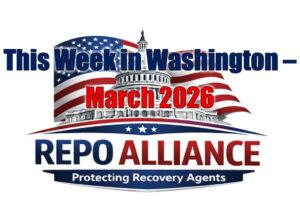Personal Property – Clients Opening Another Can of Worms?
GUEST EDITORIAL
I have been informed that on several occasions Clients (Lenders and Forwarding Agencies) have requested that an asset recovery agency, which is a member of the Eagle Group XX/USA, provide them with a detailed and itemized list of all property found in a recovered vehicle. When questioned by the member agencies I note that this request brings up numerous issues which could result in litigation by the consumer against both the recovery agency and the lender/forwarder. The question then is this a good practice?
I am not an attorney but rather base my opinions regarding this issue on various court case decisions and numerous asset recovery policies and procedures as well as sections on personal property found in the 2022 edition of the National Consumer Law Center Legal Practices Series “REPOSSESSIONS”.
The possible violation of numerous consumer privacy statutes including but not limited to the Fair Debt Collection Practices Act, Graham -Leach-Bliley Act, Health Insurance Portability and Accountability Act, and various State Consumer Protection Law when the recovery agency provides the personal property inventory to a client may even be deemed particularly egregious and in such a case the consumer’s attorney may consider seeking punitive damages in addition to actual damages.
When a repossession agency, rather than the creditor itself, repossesses a vehicle which contains unsecured personal property, the attorney may allege violation of the Fair Debt Collection Practices Act (FDCPA) or an analogous state collection law as the FDCPA prohibits debt collectors from taking any nonjudicial action to effect disposition or disablement of property if there is no present right to repossession of the property through an enforceable security interest.
The FDCPA is explicit that this prohibition applies to repossession companies. If a creditor who did not repossess their secured collateral has no right to take possession of unsecured property, then it certainly would follow that that creditor has no right to know what the unsecured property consists of if they were not the ones physically repossessing the secured property.
Currently at least eleven state jurisdictions have special statutes setting out specific requirements that apply when unsecured personal property is repossessed along with the collateral and there is little uniformity from statute to statute or state to state.
Also, by providing the lender or any third party any type of medical information which is part of the unsecured property in a recovered vehicle such as medical bills, health records, prescription drug containers, medical appointment cards, etc. there would be the clear possibility of a Health Insurance Portability and Accountability Act (HIPAA) which carries stiff penalties.
Finally, I would also advise the Eagle Group XX/USA members or for that fact anyone in the asset recovery industry that if the list of unsecured personal property is released to the client there would certainly be the high chance of a violation of the Graham-Leach- Bliley Act by providing Non-Public Personal Information (NPPI) such as Bank Checkbooks, financial statements, purchase receipts, any documents which may have the consumer’s date of birth, social security number, address, to the client.
I would state again for the record, I am not an attorney, but I certainly can see where providing a client with a list of unsecured personal items that were removed from a recovered vehicle is not the “Safe Harbor” I am seeking to build for my agency and would caution lenders and forwarders not to ask for this information as it could open a can of very dangerous worms for their entities.
Ron L. Brown
Eagle Group XX/USA












More Stories
Rising Fuel Costs Are Impacting Repossession Operations
Colorado Bill Aims to Severely Impact All Repossession Operations
Today is Fallen Agents Day – 2026
From Auction Cutting to Field Programming: The Structural Shift No One Budgeted For
Bad Apples in the Repossession Industry
Why Self-Help Repossession Is Taken for Granted — and Why Losing It Would Hurt Consumers Most